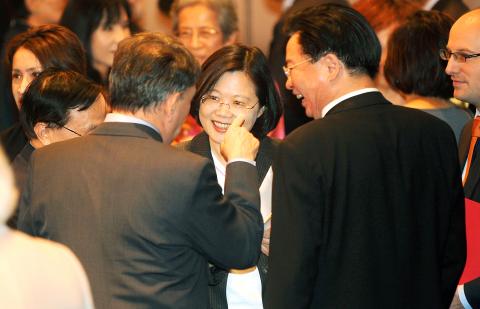The US reassured the Democratic Progressive Party (DPP) of its neutrality in January’s presidential election with an unusual diplomatic gesture yesterday, former representative to the US Joseph Wu (吳釗燮) said.
The American Institute in Taiwan (AIT) sent an unprecedented five officials, including AIT Director William Stanton, to the DPP’s 25th anniversary reception, Wu told reporters on the sidelines of the celebration at the W Hotel in Taipei’s Xinyi District (信義).
The move represented the US’ respect for the DPP, Wu said, adding that he had never seen more than two US officials at similar events.

Photo: Lin Cheng-kung, Taipei Times
It appeared as though the US was trying to “balance out” the negative impact caused by a Sept. 15 article by London’s Financial Times which was seen as an attempt to influence the election in favor of President Ma Ying-jeou (馬英九), he said.
The article quoted an unnamed Washington official — believed to be National Security Adviser Tom Donilon — as saying that DPP Chairperson Tsai Ing-wen (蔡英文) had left US President Barack Obama’s administration with “distinct concerns” about her ability to maintain stability in the Taiwan Strait.
The US would like to reassure the DPP, as well as the people of Taiwan, that it would remain neutral on Taiwan’s elections, Wu said.
Stanton was seen standing near the press area and facing the cameras, which was unusual.
“[Stanton] never mentioned anything about the Financial Times, but I guess he and his colleagues wanted to make their presence felt and make sure it was picked up by the media,” Wu said.
In her speech at the reception, Tsai recounted the party’s 25-year history and pledged to diplomats that the DPP would be an open and transparent political party and a “willing and able partner.”
Over the years, “some things have changed and some have not,” the DPP presidential candidate said.
“The party has been persistent in promoting the fundamental values of human rights, democracy and social justice — we have insisted on standing by the under-privileged and disadvantaged,” she said.
While the DPP’s founding members’ courage was tested, the new generation of leaders would be tested for their ability to manage and govern, Tsai said.
“The DPP today is more experienced and [better] prepared than ever for the opportunity to govern again,” Tsai told dozens of foreign dignitaries.
However, the party would not win next year simply by criticizing the current government’s incompetence, Tsai said.
“Instead, we shall win by convincing the people that we are more competent and mature than the Chinese Nationalist Party [KMT],” she said.
“We shall win by presenting policy choices that are more progressive and responsive to the real needs of the people, and we shall win by being the positive force that transcends the divisiveness of the past and unites the people of Taiwan,” she said.

Right-wing political scientist Laura Fernandez on Sunday won Costa Rica’s presidential election by a landslide, after promising to crack down on rising violence linked to the cocaine trade. Fernandez’s nearest rival, economist Alvaro Ramos, conceded defeat as results showed the ruling party far exceeding the threshold of 40 percent needed to avoid a runoff. With 94 percent of polling stations counted, the political heir of outgoing Costa Rican President Rodrigo Chaves had captured 48.3 percent of the vote compared with Ramos’ 33.4 percent, the Supreme Electoral Tribunal said. As soon as the first results were announced, members of Fernandez’s Sovereign People’s Party

MORE RESPONSIBILITY: Draftees would be expected to fight alongside professional soldiers, likely requiring the transformation of some training brigades into combat units The armed forces are to start incorporating new conscripts into combined arms brigades this year to enhance combat readiness, the Executive Yuan’s latest policy report said. The new policy would affect Taiwanese men entering the military for their compulsory service, which was extended to one year under reforms by then-president Tsai Ing-wen (蔡英文) in 2022. The conscripts would be trained to operate machine guns, uncrewed aerial vehicles, anti-tank guided missile launchers and Stinger air defense systems, the report said, adding that the basic training would be lengthened to eight weeks. After basic training, conscripts would be sorted into infantry battalions that would take

GROWING AMBITIONS: The scale and tempo of the operations show that the Strait has become the core theater for China to expand its security interests, the report said Chinese military aircraft incursions around Taiwan have surged nearly 15-fold over the past five years, according to a report released yesterday by the Democratic Progressive Party’s (DPP) Department of China Affairs. Sorties in the Taiwan Strait were previously irregular, totaling 380 in 2020, but have since evolved into routine operations, the report showed. “This demonstrates that the Taiwan Strait has become both the starting point and testing ground for Beijing’s expansionist ambitions,” it said. Driven by military expansionism, China is systematically pursuing actions aimed at altering the regional “status quo,” the department said, adding that Taiwan represents the most critical link in China’s

‘REALLY PROUD’: Nvidia would not be possible without Taiwan, Huang said, adding that TSMC would be increasing its capacity by 100 percent Nvidia Corp CEO Jensen Huang (黃仁勳) on Saturday praised and lightly cajoled his major Taiwanese suppliers to produce more to help power strong demand for artificial intelligence (AI), capping a visit to the country of his birth, where he has been mobbed by adoring fans at every step. Speaking at an impromptu press conference in the rain outside a Taipei restaurant, where he had hosted suppliers for a “trillion-dollar dinner,” named after the market capitalization of those firms attending, Huang said this would be another good year for business. “TSMC needs to work very hard this year because I need a lot